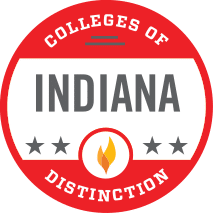Anderson University
Campus Facts
With about 1,300 students calling Anderson University home, it can be hard to sum up the experience of life on campus. We have more than 130 ways to get involved, including 20 NCAA Division III sports, intramurals, clubs, and service opportunities. Our community gathers twice per week for Chapel, which is just one of the ways we are a safe place to grow in your faith journey. This is a place to know and be known – all while preparing for lives of faith and service to the church and society.

community info
ENROLLMENT DATA
- Applications (Undergraduate): 5,582
- Acceptance rate (selectivity): 77%
- First-time enrolled: 351
- Transfers: 32
- Total entering class: 394
- Undergraduate enrollment: 1,092
- Graduate enrollment: 136
- Total enrollment: 1,228
STUDENT ACHIEVEMENT*
- Freshmen from top 25% of class: 39%
- Freshmen from top 10% of class: 17%
- Average SAT score: 1026
- Church of God representation: 11%
- Minority student representation: 25%
- Freshman to sophomore retention rate (2023-24): 57.03%
- Student body fall to fall retention rate (2023-24): 74.84%
- 6 year completion rate (cohort 2016): 60%
- 8 year completion rate (cohort 2016): 60%
- Full time employment rate of graduates (2023-24): 76%
- Placement rate of graduates (2023-24): 87%
FACULTY AND STAFF*
- Full-time faculty: 84
- Part-time faculty: 100
- Full-time staff: 147
- Minority faculty and staff: 41.2% of student representation
*IPEDS data
DEGREES OFFERED
In each program, you’ll find out more about who you are and what you were made for as you study under some of the top minds in their fields. Discover what’s possible for your next career move on your own terms.
Undergraduate
Bachelor of Arts
Bachelor of Science
Bachelor of Science in Nursing
Bachelor of Music
Associate of Arts
Associate of Science
graduate
Master of Business Administration
Doctor of Business Administration
Master of Divinity
Master of Theological Studies
Master of Arts in Christian Ministry (Online)
Master of Music Education
recognition














tuition & fees
COSTS REFLECT FULL-YEAR, FULL-TIME ENROLLMENT FOR 2025-26
- Tuition and fees for undergraduates: $37,596
- Room and Board: $15,220
- Total: $52,816
Statement of Compliance
Anderson University is authorized by name by the State of Indiana.
Anderson University maintains compliance with applicable federal and state statutes related to private institutions of higher education including the Family Educational Rights and Privacy Act (FERPA), as amended; the Student Right to Know Act, as amended; and the Solomon Amendment. In compliance with the Civil Rights Act of 1964 and 1991, Title IX of the Educational Amendments of 1972, Section 504 of the Rehabilitation Act of 1973 and the Americans with Disabilities Act of 1990 as amended, the university does not discriminate in its educational programs or admissions procedures. Anderson University is a not-for-profit exempt organization as described in Section 501(c)(3) of the Internal Revenue Code.
Institutional Data
Annually, during the fall semester, institutional data is collected and provided for public release on the Anderson University website. Information integrity is upheld by releasing data coinciding with the year the data was collected.
Student and Prospective Student Complaints
The Commission for Higher Education is responsible for responding to formal complaints against public, independent non-profit and proprietary institutions of higher education in Indiana. While the Commission has limited authority over colleges and universities, and cannot offer legal advice or initiate civil court cases, Commission staff will review submitted complaints and work with student complainants and institutions. Submit a complaint online through the Indiana Commission for Higher Education.
Anderson University participates in the National Council for State Authorization Reciprocity Agreements (NC-SARA) as an approved Indiana NC-SARA institution. In full compliance with federal rules, please consider contacting the Indiana Commission for Higher Education for Indiana’s higher education complaint resolution process. Students taking classes online and not located in Indiana, please click here to find the appropriate place to file a complaint for your state.
Student Complaint Policy
Anderson University tries at every level to operate with integrity and with concern for the general welfare of students. The university has established processes and procedures to address more typical concerns, complaints, or appeals by students and are listed in the “student complaints” section of the Student Handbook.
STANDING PROCESSES FOR STUDENT COMPLAINTS
| Policy | Location of Records |
| Academic Integrity Policy | Provost |
| Grade/Academic Credit Appeal | Registrar |
| Non-Academic Code of Conduct | Student Life |
| Title IX (Sex/Gender Harassment, Discrimination, and Misconduct) | Title IX Coordinator |
| Financial Aid Appeals | Office of Financial Aid & Scholarships |
| Housing Appeals | Director of Residence Life |
| Racial Harassment | Student Life |
| Personnel Employment Conduct | Work Life Engagement |
FORMAL PROCESS FOR STUDENT COMPLAINTS
Anderson University values student feedback that can help the institution determine effectiveness and clarify and improve processes, policies, and procedures. In recognition that, on occasion, events arise in which students have complaints that fall outside of other institutional policies developed to address student concerns the university has a process whereby students may submit a formal written complaint.
If a student wishes to lodge a more formal complaint this must be done so in writing using the following complaint form. Submission of this form goes to the executive assistant to the president, who determines who will respond and address the written complaint. The designated person will be notified and will respond within five business days of receipt of the complaint with the response copied to the executive assistant to the president.
If an issue cannot be resolved by the university’s internal processes students may file a formal complaint with the Indiana Commission for Higher Education at https://www.in.gov/che/2744.htm.
The Formal Process for Student Complaints is not for a routine decision (e.g. grade change, requirement waiver, etc.) or for an appeal or a grievance for which a defined process already exists (e.g. grade appeal, academic integrity, Title IX/sexual misconduct, racial harassment, etc.).
TRACKING FORMAL COMPLAINT INFORMATION
All formal written complaints meeting the relevant criteria and deemed of sufficient substance will be tracked by the Office of the President. The database tracking system includes the following elements:
- Date complaint received
- Student(s) identified with complaint
- Nature of complaint
- Office assigned to address the complaint
- Steps taken to resolve complaint
- Institution’s final decision
- External actions by complainant (e.g., lawsuit, EEOC, OCR, etc.)
STUDENT COMPLAINT FORM
A formal complaint must be submitted in writing to the [assistant to the president] within sixty (60) days of the event that triggered the complaint. Written complaints must be submitted on the Formal Student Complaint Form here.
Accreditation
Anderson University is accredited by the Higher Learning Commission, (230 South LaSalle Street, Suite 7-500 Chicago, IL 60604 800.621.7440).
Learn more here about program-specific accreditations and outcomes for:
- Athletic Training
- Business
- Computer Engineering
- Education
- Electrical Engineering
- Mechanical Engineering
- Music
- Nursing
- Social Work
- Theology